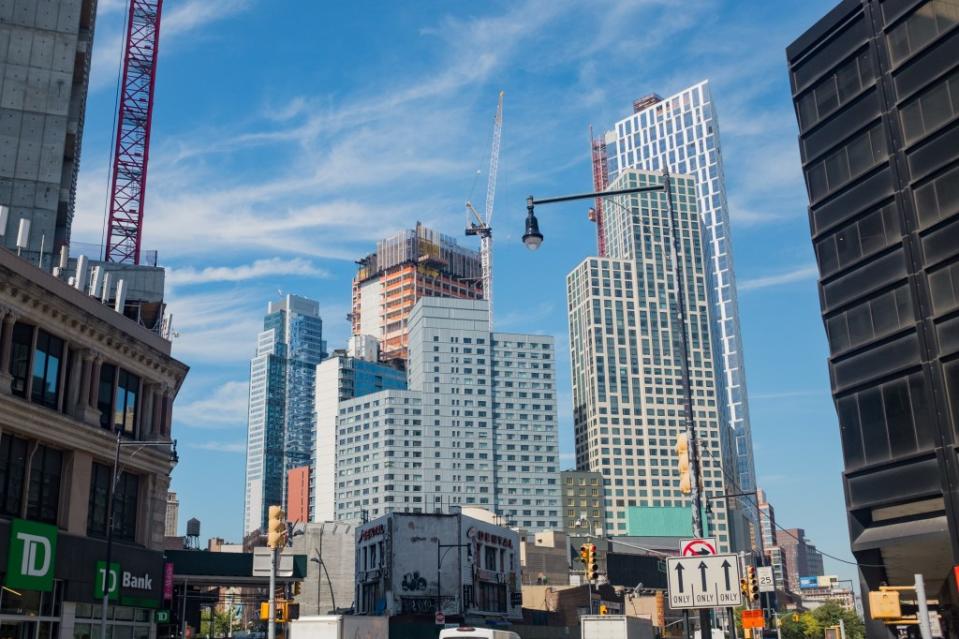NY state budget talks drag on with little clear agreement on Hochul’s housing plan

New York state budget talks will drag on in Albany this week as lawmakers remain optimistic despite signals that there’s little agreement on major issues such as housing.
Gov. Kathy Hochul is seeking a major package of legislation meant to develop more housing in the Empire State but the measure looks more and more questionable as questions swirl over details — and officials blow past the budget’s April 1 deadline.
Last week, several building trades groups released a statement saying side-negotiations had effectively stalled with the powerful Real Estate Board of New York.
Labor and REBNY are negotiating labor standards, including a base wage for workers, as part of a renewal and replacement of an expired tax-incentive structure to encourage developers to ramp up affordable housing.
“Both sides must compromise, and we have offered significant concessions, so have housing advocates. All REBNY has offered us is scraps,” the joint statement reads in-part.


REBNY responded with a statement calling for continued negotiations.
The labor negotiations are critical to a housing deal because the end-game benefit of a tax incentive for developers depends on how much they ultimately have to pay workers as part of that deal.
For now, Albany is staying on the sidelines.
“It would be premature, as far as I’m concerned,” Senate Majority Leader Andrea Stewart-Cousins (D-Westchester) said dismissing the idea of stepping in to broker a deal with REBNY and the building trades.
“I won’t be overreacting to this,” she continued. “I think we’re all going to keep our head down and try to get everybody at the table to come to something that will benefit our grand desires for building and supporting housing.”

But even Stewart-Cousins’ lead budget deputy, state Senate Finance Committee Chair Liz Krueger (D-Manhattan), said as recently as Thursday that it’s time for Albany to step in.
“Yes, I actually think if this is going to be a government program, government should be at the table,” Krueger told reporters in a Capitol hallway Thursday while flanked fellow Manhattan Sen. Brian Kavanagh (D-Manhattan).
Kavanagh, who chairs the state Senate’s housing committee, appeared more willing to let REBNY and the trades talk amongst themselves.

“We’re going to spend a great deal of public resources and in exchange that we expect public goods and one of them is affordability and the other is good jobs, but the scope of that deal has to be worked out between the trade unions,” Kavanagh said.
Assembly Speaker Carl Heastie (D-Bronx) said he wanted a wage deal to be struck before signing off on a housing deal.
The labor negotiations are just one complex aspect, and arguably not even the most contentious, of a litany of items that have to be mended before striking any substantive package.

One of the most fierce debates is likely to come down to the inclusion of tenant protections in a final deal. Housing activists have been swarming the Capitol to pressure lawmakers not to back down from their prized proposal–Good Cause Eviction. The plan is fiercely opposed by landlords big and small who argue it would unfairly place restrictions on renewing leases and raising rent.
“Vague assurances of tenant protections from state leadership will not be enough: Good Cause Eviction must be passed in the budget – and it must be statewide and robust,” Cea Weaver, coalition director for Housing Justice for All, wrote in a statement last week.
Aside from housing, negotiators remain at odds with Hochul’s proposals to change funding formulas for K-12 schools and to rein in out-of-control spending in some Medicaid programs.
Meanwhile, several other pervasive issues remain up for debate in the Capitol, including measures to combat retail theft and illegal pot shops, an attempt to revise the state’s wrongful death statutes and environmental activists’ efforts to curb expansion of natural gas infrastructure.
Albany passed emergency budget extenders last week to keep the state government running through Thursday.
Blowing past the deadline didn’t come as much of a surprise to anyone in Albany, but the question now turns to just how long negotiators are willing to let talks drag on without a deal.
The bulk of last year’s budget was delayed until May 2, requiring six of budget extenders.

 Yahoo News
Yahoo News 
